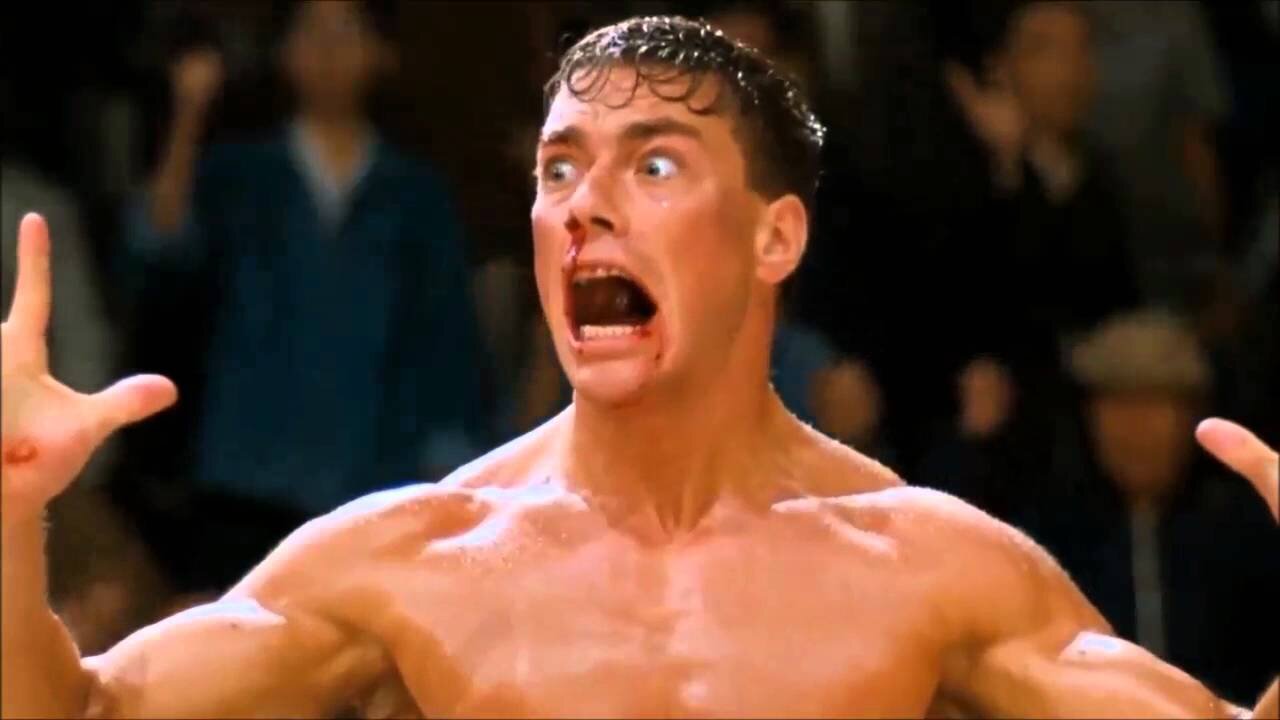Three Things You Must Know About Testosterone
1988’s martial arts epic, Bloodsport, is still known as one of the most brutal representations of testosterone in film. But as legend has it, the whole thing was cooked up by the movie’s real life protagonist, martial artist, Frank Dux. At least we’ll always have you, Mr. Van Damme. Image: Warner Bros.
It’s time we rethought testosterone.
Yes, well-established facts—like how zinc can help stimulate more testosterone production for guys low on the stuff—abound (more on that later).
But as for the rest? Look at it this way—testosterone isn’t just falling worldwide (more on that later, too), it’s more misunderstood. Long associated with primality and losing one’s shit, testosterone, it turns out, is much more mysterious—and more beneficial—than we’ve thought.
Take the example of men doing heinous things in the name of geopolitical power (read: dudes like Napoleon and Stalin). Is it a surprise a recent University of Texas at Austin study found psychopaths can have a ton of testosterone? Most of us would say no, but whether or not that’s a product of external influence is up for a debate. Regardless, that same study, which explored the connection between testosterone and morality, also found that doesn’t mean the hormone nulls a psycho’s ability to value norms, and that “if anything, testosterone [supplements] seems to have the opposite effect, increasing people’s sensitivity to moral norms, as found in the current study.” It makes one think.
The formula of testosterone, man’s key to getting jacked and smashing depression.
And that’s just one fact.
Most peer-reviewed literature makes it clear—testosterone is a man’s ticket to living a long, happy life. But that’s not news. The following, however, isn’t what we’d call “common knowledge.”
Testosterone’s On the Dip, And We Don’t Know Why
Whether you were alive for it or not, the ‘80s was testosterone’s peak, its last glorious gunshot in the air. Sure, the decade of decadence had its head scratchers (we’re looking at you, Flock of Seagulls’ hairstylists), but counterbalancing the neon lights and weird hair were three things: Violence, muscles, and guns. For an example of this, just watch 10 minutes of 1987’s Predator, a sci-fi classic about a crew of ex U.S. militia who run into a killer alien in the Guatemalan jungle. A young Schwarzenegger's presence aside, the movie epitomized the grandeur of the era, one obsessed with everything big, bold and loud. It was the time of shoulder pads, explosions and men walking away from them. And while the abject sexism of the ‘80s and ‘90s is all but gone, there’s no denying that, in a sense, a pendulum has swung in the other direction. Men, on average, just haven't looked or felt as manly ever since. Today, it’s the lean physiques of admitted warriors like track legend, Usain Bolt, that represent man physical peak, with the possible exception of soccer icon Cristiano Ronaldo. That guy’s lats are so big he could probably glide with them flexed. But, would you put your money on him in a fight with a hulking alien that hunts soldiers for sport? Yes, Dwayne “The Rock” Johnson and Dave Bautista have careers, and healthy ones, too. But monsters like these are now, for all intents and purposes, a niche, whereas a couple of decades ago we would’ve seen them everywhere, from the iconic Rambo movies to everything else Arnold did.
Either way, testosterone has literally declined since those days of muscles and mullets. Because according to a now legendary 2007 study, they have been in the U.S. for at least 40 years now. And to quantify things, Dr. Thomas Travison, who lead the study at the New England Research Institute in Watertown, Massachusetts, found that testosterone’s been dropping at about a rate of one percent a year. Yes, the researchers—and most of us—knew then that an average guy’s testosterone dips as he ages. But there was no question the decline was faster than the average. And at the time, Dr. Travison and his crew just couldn’t figure this out. They figured rising obesity and diabetes could be big culprits, since studies have shown heavy-set men can have low testosterone.
Ask Dr. Lawrence Komer, a renown Burlington-based interventional endocrinologist who treats everyone from CFL players to “military guys” who he “can’t talk about,” and he’ll say environmental toxins are one of testosterone’s nemeses. “Things like fertilizers have estrogen in them, but it isn’t big enough of a deal where you can say, ‘Yeah, it’s the environment.’ There’s just not enough proof of that.”
Which brings us to point two…
Low Testosterone Isn’t An Age Thing Anymore
It used to be that testosterone was the fountain of a man’s youth. And yet, it’s that very word—“youth”—that might’ve mired the one truth about testosterone that’s now clear: Low testosterone isn’t an age thing, at all.
Muddying things more is a 2012 study that was co-authored by Gary Wittert, professor of medicine at the University of Adelaide. Out of 1,382 men who participated, researchers found that for the most part, it was bad habits like eating crap that contributed to low testosterone. The results showed age bore little to no consequence on things, and keep in mind the average age of participants was 54.
And while it’s normal for men over 50 to have low testosterone, that’s not the same as saying low testosterone is an old man’s problem. According to Dr. Komer, connecting age and low T levels is a stigma we need to nuke, and fast. “We can’t keep perpetuating this myth. I’ve seen teenagers as young as 16 who are in desperate need of it.”
Testosterone Is In Your Head (Kind Of).
Testosterone’s made in a man’s balls, simple as that. And while a lot of you knew this fact, here’s another one you might not have known—while it’s produced down low, it technically originates in the pituitary gland, something the size of a pea that’s tucked just behind our nose and resting right under our brain. Besides keeping our organs functioning via signals, this gland’s main task is to pump out several types of hormones that, in turn, stimulate specific hormone growth in places like our thyroid glands, a woman’s breasts (so she can lactate) and, yes, a man’s balls. That’s why Dr. Komer specializes in treating concussed men, like the aforesaid athletes who take one too may knocks up top and start “showing the classic symptoms,” as he puts it. “Last year, I saw two 28-year-olds, both of whom suffered from cardiac arrest, and their doctors told them there’s no real cause. I couldn’t believe it. Turns out they had really low testosterone. I’m telling you, two percent of testosterone affects the muscles, but the rest? The rest is life and death. People don't get that. This is today’s menopause for boys.”
Dr. Komer’s approach to treating low testosterone (or “hypogonadism”) means everything for countless young men who, according to him, “are coming in and they have no idea what's wrong.” He says guys in their twenties and thirties go in complaining about cardiac problems, depression, constant fatigue, bad sleep, and a plummeting libido. “By the time guys get to the point of having a low sex drive,” says Dr. Komer, “that’s when they realize it’s from low testosterone.”
“I’ve got badly injured guys saying, ‘Wow, my shoulders are healing so fast with the trt [testosterone replacement therapy],’” says Dr. Komer. And that’s not in the least because testosterone helps repair wounds and torn muscle tissue.
“We use a lot of natural stuff, like zinc,” says Dr. Komer. “Zinc’s amazing. What it does is help reduce a ton of inflammation caused from head injuries,” something in which Dr. Komer specializes. As a team doctor for contact-sport clubs like the Toronto Rock and an expert in exercise physiology, Dr. Komer’s seen the worst head hits imaginable, and his team’s work casts a needed light on the tie between concussions and the spiralling of a man’s life. “A single blow to the head can knock out the pituitary gland just like that, and that gland regulates all of your hormone function.” After that, we’re talking debilitating depression, extreme anxiety, no sleep, suicidal thoughts, you name it.
With regards to mental illnesses, Dr. Komer’s stand on psychiatric drugs is staunch: “Taking an anti-depressant for the type of depression caused by low testosterone is like putting vinegar in your gas tank. Why would you do that? And by the way, anti-depressant doesn't lower the death rates—testosterone does.”
“And believe it or not, [testosterone] replacement therapy doesn’t raise the risk of prostate cancer,” stresses Dr. Komer while referencing a long-standing worry that TRT could cause cancer. The doctor’s claim is backed up by recent studies that fail to find a solid connection between TRT and cancer, and some studies even show it’s the other way around, that replacement therapy could actually prevent prostate cancer.
And just last year, Mr. Wittert, the aforementioned Aussie medicine pro, released findings from a two-year trial that showed TRT can likely treat type-two diabetes.
“Like I said,” reminds Dr. Komer, “people need to know this stuff.”
So what do you do if, say, your testosterone’s good (something that should be confirmed with a requisitioned blood test by your doc), and you want to keep it that way?
Work the hell out. Aside from the tried and true technique of picking up heavy shit and putting it back down, research shows high-intensity interval training—things like running and wind sprints—pumps all kinds of testosterone. Don’t forget those six to eight hours of sleep, either.
And because it can’t be stressed enough, zinc’s gold for this sort of thing (there’s a lot of the mineral to be had in foods like fish, chicken, and good old fashioned beans). There’s Vitamin D, too, the likes of which has been tied with testosterone for years now. Thing is, there’s conflicting evidence regarding its effect on our T levels. While one famous 2011 study conducted on healthy overweight men showed that Vitamin D does boost testosterone, a more recent one from 2017 showed the opposite.
Regardless, Vitamin D does crucial things like regulate hormones, strengthen bones and toughen your immune system, so get it in you every day (especially since we make less of it as we age). Just be sure to consult a doctor before popping supplements; they’ll tell you how much you’ll need and how often to take them.
But most of all, remember—just because testosterone fades with time, doesn’t mean its owner has to, too.
He just has to be smart, and do what’s right.
Then he can take out the man-killing martians.
.


